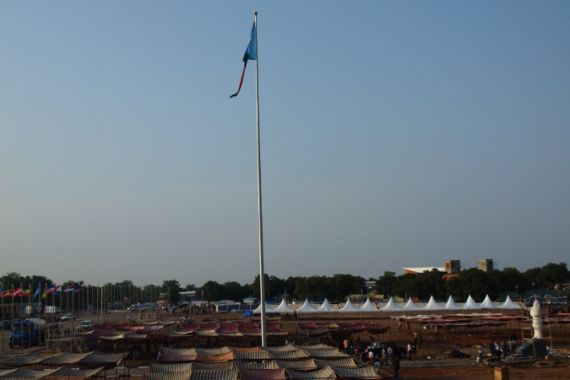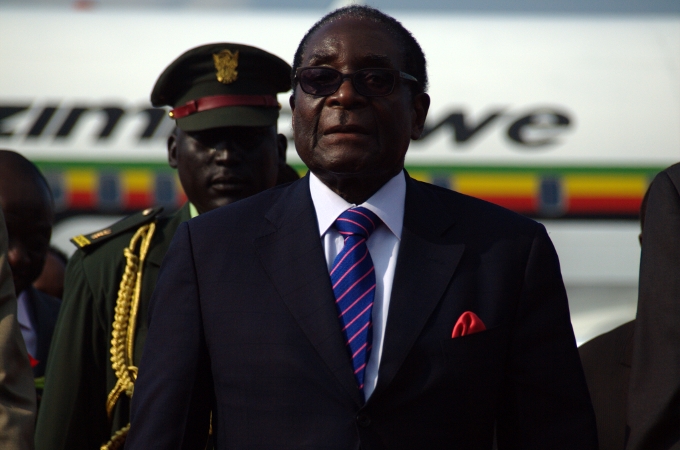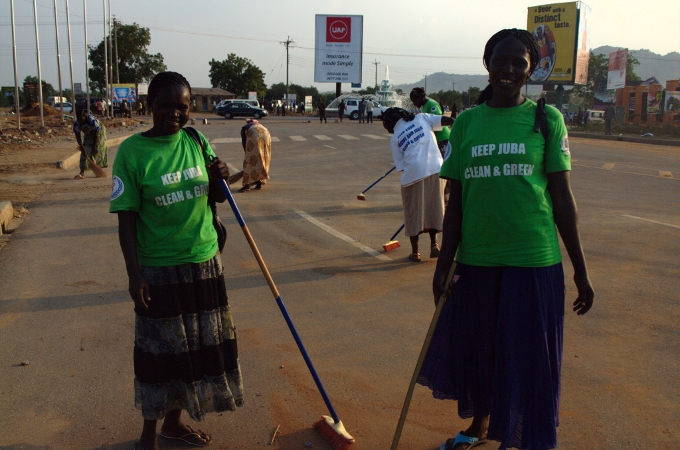Celebrations in S Sudan but challenges ahead
Flurry of pre-independence activity in the capital of South Sudan, as workers clean up and dignitaries arrive.

Juba, Sudan — Along one of the main roads near the South Sudanese capital’s airport, a group of a half-dozen young men are hanging flags from newly-erected streetlights.
“We want to show off Juba to the world,” said John Bol, one of the men. “We are tired of war. Now we want to build.”
There is a bustle of activity aimed at sprucing up the capital ahead of Saturday’s independence celebration. Groups of women, wearing t-shirts that read “Keep Juba Clean and Green,” wield pushbrooms to tidy up Juba’s dusty streets. Workmen are busy repainting the gates outside government ministries.
The city’s small airport will be closed to commercial flights on Saturday to make room for arriving heads of state and other VIPs. Several of them – including United Nations secretary-general Ban Ki-moon and Zimbabwean president Robert Mugabe – arrived on Friday afternoon.
Security has been tightened at the site of Saturday’s celebration, the mausoleum of John Garang – the longtime leader of the Sudan People’s Liberation Movement who was killed in a helicopter crash in 2005. Workers have built a stage for dignitaries and erected crude tents to shield Sudanese officials and army officers from the sun.
“We have only been working on this for one month,” said Deng Joseph, taking a break from lining up plastic chairs under the tents. “It was delayed. So we have been working like ants for one month.”
Others are making more personal preparations. At a beauty salon inside the Safari Hotel, six women were having their hair and nails done for the ceremony; half of them were members of the South Sudanese diaspora who travelled to Juba from Europe and the United States.
“I’m excited. It’s not easy growing up in a country that isn’t your own,” said Suzanna Benjamin, a Sudanese-American woman from the Washington area. “I hope this new country is a democracy with no corruption. But I know it will be baby steps.”
The last few days have been a bustle of activity for government officials, as well; several of them cancelled interviews or public appearances so they could receive dignitaries or finalise last-minute preparations for Saturday.
Many of the symbols of statehood have already been decided upon. There is a new national anthem, which will be sung in public for the first time at Saturday’s independence ceremony. The six-coloured flag already flies from buildings around the capital, sometimes alongside the Sudanese flag; the latter will be retired after Saturday. A new constitution was approved on Wednesday night.
New policy for a new country
For all the preparations, though, there are daunting issues that will confront the government after Saturday’s celebrations.
 Mugabe arrived on Friday; most dignitaries are expected to arrive on Saturday
Mugabe arrived on Friday; most dignitaries are expected to arrive on SaturdayPublic expectations are reasonable – few South Sudanese expect their long-neglected nation to prosper overnight – but enthusiasm will turn to frustration if the government does not start to provide basic services. Most roads are still unsealed dirt tracks; health care is extremely basic; and essential services like trash collection and sewage are not provided.
“I think education will be the key,” said Clara Benjamin, one of the women at the Safari Hotel beauty salon. “We need training colleges that give people a chance at a future. It’s a blank slate.”
South Sudanese officials are generally optimistic about the prospects for setting up a new state. The agriculture minister has a plan to quadruple the output of farmers by next year. The education ministry wants to establish eight new universities over the next four years.
“This would give us one university for each of the states of Southern Sudan,” said Michael Milli Hussein, the education minister. (Upper Nile State and Central Equatoria State, which houses the capital, already have universities.)
But the government has struggled in the past to turn its plans into reality. One example is demobilisation: The 2005 Comprehensive Peace Agreement between north and south Sudan required both sides to demobilise 90,000 soldiers. Just 12,000 have successfully completed the programme so far in the south.
Nonetheless, the country’s disarmament, demobilisation and reintegration commission has already announced a second round of the programme.
“We are a new country, and we need a new policy,” said William Deng Deng, the head of the commission. “If the policy is approved, we are talking about another 15,000 soldiers who will be disarmed and returned to civilian life.”
It is an admirable goal – the army, now approaching 200,000 men, chews up more than half of the national budget – but a difficult one, as the first round of disarmament shows.
Petroleum and pounds
Then there are the major political questions which the new government will need to tackle.
 Dozens of women with pushbrooms have been cleaning up Juba all week
Dozens of women with pushbrooms have been cleaning up Juba all weekOne is, of course, oil – the share of revenues allocated to South Sudan, which produces the oil, and to Sudan, which refines and exports it.
The government has said little about this issue, and a senior official at the petroleum ministry declined to comment. Analysts expect a final agreement between Khartoum and Juba will take months.
A more pressing concern is the question of money – how quickly the south will separate its currency from the north. Last month, the government said it would issue the new currency immediately after independence. It quickly backtracked, after officials in Khartoum warned that such a move would massively devalue the Sudanese pound, and said it would postpone the currency question for one year.
Now the government’s position has changed again: The new currency has already been printed, according to information minister Barnaba Marial Benjamin, and will be issued “within the next few weeks”.
“Definitely, we will have our currency going,” he said. “It will be issued at the appropriate time after negotiations with the Central Bank in Khartoum.”